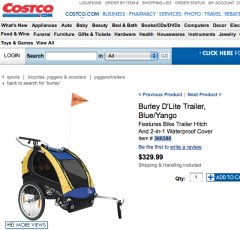
D’Lite on sale at Costco.com.
When a friend of mine said they saw Burley trailers being sold at big-box retailer Costco last week, I was shocked. Based in Eugene, Oregon, Burley is known as a premium priced, quality brand in the bike industry. Selling to a big box retailer like Costco dilutes that reputation. This upsets dealers, who rely on the strenth of a brand’s reputation to sell products at full retail price.
“In hindsight, we will never do it again.”
— Michael Coughlin, Burley CEO
On Sunday, Bicycle Retailer & Industry News (BRAIN) published some background on the story and a mea culpa from Burley CEO Michael Coughlin.
In Burley Renounces Costco Decision BRAIN reports:
Burley arranged to sell about 1,000 units through the wholesaler in a one-time deal to quickly get rid of some leftover 2008 Delite, Solo and Rover trailers.
But according to Coughlin, that was a big mistake. He told BRAIN that, “In hindsight, we will never do it again.”
So, are there any left? Can you still get a smokin’ deal on a new Burley? Yep, but you’ve got to act fast:
Coughlin predicts the product…will be sold through Costco within 30 days. About 10 percent of the stock, or about 100 units, will be sold through Costco.com while the rest will be sold in stores, Coughlin said.
A quick check at Costco.com shows the Burley D’Lite model selling for $329 (regular price is $525).
— For more, read the full story at BicycleRetailer.com.







Thanks for reading.
BikePortland has served this community with independent community journalism since 2005. We rely on subscriptions from readers like you to survive. Your financial support is vital in keeping this valuable resource alive and well.
Please subscribe today to strengthen and expand our work.
Or you can pick the 2007s up for about a quarter of that price on Craigslist.
My, my, my, how the mighty have fallen…
When Burley fell on hard times in 2006, they tried for some time to avoid restructuring so they could maintain their cooperative structure. Tried as they might, the changing economy was too much for the company to handle and in 2007 they filed papers to end their cooperative structure.
In mid-2007, the house of cards fell (when owners could not pay out of pocket to help the cooperative recoup some of their losses, and former owners complained about the falling value of their shares in the company, and, and…). In fall of 2007 the company was sold to Coughlin. At the time of the sale there were still close to 100 people working at Burley. The day after the sale, nearly a third of those people were let go. At that time, some sub-assemblies were already being made in China while final assembly was still being done in Eugene.
Today the company has a little over 20 employees still working in Eugene. The trailers are now being made entirely outside the United States. The economy is deeper in the toilet and Burley is struggling Just Like Any Other Manufacturer.
While Burley is not a boogeyman, neither is it the inspiring example of The New Workplace that it used to be. Predictable, I suppose, but very sad all the same.
I imagine that at least a few independent bike shops in the US that sell Burley may rethink their relationship with the company in light of this move. The smallest bike shops simply cannot compete with big-box stores; and even if this was a one-time mistake, it was still a very big mistake.
Yikes.
Maybe this is overly simplistic, but seeing how all the problems started in 2006 and 2007 – a period of great growth and optimism in the bike industry, how did they find a way to lose money then? And who made the call to shut down their industry-leading bike apparel line?
A nice writeup on the recent history of Burley was done in the Spring 2007 issue of Oregon Quarterly, published by the University of Oregon.
Link to article in their library for download (PDF):
https://scholarsbank.uoregon.edu/xmlui/handle/1794/5233
Peejay, they shut down all product except trailors I think when they disbanded the co-op and sold to a private investor. I do agree though with the surge in new cycling business and companies over the last few years, I wonder if different leadership would have allowed a profitable burley and the ability to still buy a rain rider jacket today.
“So, are there any left? Can you still get a smokin’ deal on a new Burley? Yep, but you’ve got to act fast:”
Or, you can take your time and go to your neighborhood Bike Gallery. Same deal on the same trailer if I am not mistaken.
In regards to brand image, selling through Costco is far better than selling through Wal-Mart. 🙂
So Burley trailers are now produced overseas but are still retailing at a premium price? Well NOW my perception of their brand has just dropped into the toilet.
Time to join AC/DC and iDrone, and just release their products straight to Walmart.
The sad truth is that, in light of a falling dollar and global recession that has been in the making for several years, almost no one can make product on a large scale in this country without charging what the buying public would see as an exhorbitant price.
Even Rickshaw, the “upstart” bag maker whose leadership broke away from Timbuk2 (who now make just about everything in their line overseas), has their bag sub-assemblies made in China. Reason? They do great work for relative peanuts.
Local product IS being made, and much of it is smart and innovative and beautiful. Citybikes Bike Buckets, Black Star and Lemolo bags and half a dozen cycling cap makers come to mind. But these items are all being made on a local scale as well; you won’t find them at every bike shop in the country, and in some ways that’s more appropriate to rebuilding America’s manufactuyring sector. Local product is being made and sold locally (or at most regionally), with intersting and notable differences in style and construction based on the innovations and needs of people living in a particular area.
Small business was once the backbone of the US economy. Maybe it can be again someday.
The initial trouble Burley got into was as a result of selling to big box stores. Namely Wal-Mart and REI.
Once in bed with these large retailers, they found themselves beholden to them. Since such a large part of their revenue stream was tied to the chain stores, they were forced to placate the needs of Wal-Mart first, to their own demise. The box stores demand larger and larger shipments of one or two items at cheaper and cheaper prices. That is what killed Burley. Their existing business model was simply not in line with the needs of their new ‘partners’.
The real story should have been about how big box retail destroyed a worker owned coop. You know, a few years ago when Burley actually died.
That’s right. Big Box retailers are poison to the world economy. Once they’ve got a hold on a company’s production, it can easily be a death grip.
This business of contracting production to places where people will do the work for ‘peanuts’ is stupid. Nobody wants to do that kind of demeaning labor forever, nor should they have to. If we’re not careful, someday, it could be U.S. workers that are producing things for ‘peanuts’ for other countries.
Instead of unloading their oversupply on small business or blowing it out to Big Box retailers, maybe Burly could have given them away to various programs that promote bike transport of goods as an alternative to the same by motor vehicles. Write off the loss as a donation.
Just a couple points of clarification:
Burley has been selling through REI for over 15 years. They have been a great partner and represent our product line well.
Burley has and will continue to sell trailers through the IBD market.
Burley has never sold through Wal-Mart and will never sell through Wal-Mart.
Costco was able to help Burley move some obsolete product and this will allow new product to be sold at MAP and not be undermined by old stock in the field. Mike Coughlin decided to not sell to Costco again after speaking with some key dealers.
The Burley rainwear was a great product but had limited appeal a the price point. It was not a profit center for the company. Other companies have stepped in and done a great job providing good quality commuting gear at a good value.
This is a related story that was going around the web last week. The CEO of Snapper decided to quit selling their products at Walmart because it was diluting their reputation as a premium product and weakening their independent dealer network.
http://www.fastcompany.com/magazine/102/open_snapper.html
I beg to differ on the question of rainwear:
Val says that Burley rainwear had “limited appeal” at that particular price point. It would be interesting to compare notes and clarify what is meant by “limited”. I know that Burley made a significant move in the final years of their rainwear production to market more of their line overseas, particularly in Europe. When they did that, there may have been a falling-off in sales relative to the new, larger market.
While Burley sold mostly in the US it did very well. I am sorry it’s no longer available. Like many who saw the writing on the wall, when Burley couldn’t deliver our 2007 pre-season order, I bought doubles of pants and shoe covers, knowing I’d likely never see them again. I was right.
I am not a marketing expert but there seems to be something false about the value of a product if you have to use these types of price-setting techniques to maintain its’ value. If they are being sold for less than their value, then it’s a clearance sale and should be advertised as such.
I bought a $150 kidarooz trailer at Costco about 4 years ago and when I went to try and find some spare parts for it, I found out it was the EXACT same trailer as a $400 one whose name escapes me. They even had identical user manuals. The fabric was a different color and the more expensive version came with about $50 worth of extra interchangeable parts. There were no links between the two websites or any indication anywhere that the parent company was the same, you would have had to actually read the user manuals of each to see that they were identical. The phone number to call was even the same! When I called to order the parts I needed, they admitted that the hook-up thingie (highly technical term invented by me) I wanted that came with the expensive version would work on mine although they didn’t really want to admit that the trailers were identical even when I asked directly, I can’t remember what I was told but it was a sketchy, evasive answer. I had to order the parts through a retailer and the retailer was actually very surprised to learn that the parts would work.
What’s ironic is that many bike snobs I know were somewhat snooty about my costco trailer, knowing nothing about the brand itself, only that it was bought at costco. I actually tested out trailers at a bunch of different stores before buying this one and I was always happy with the quality. It was definitely heavier than a burley, which I could never afford and believe me, I looked on craigslist for months trying to nab one before I bought this one from costco. Anyway, it just goes to show you that being a snob doesn’t get you anywhere except in debt.
#12 good post.
#13 It’s recycled from the book Wal-Mart effect by Charles Fishman. A very good read and he plays it down the middle for folks to make their own decision.
Costco is known as one of the world’s best retailers – not “discounters.” There are many fine brands there, including Godiva, Sony, Cartier, Dom Perigon. I don’t think there is a dilution of brand so much as there is an opportunity for this company to move through their inventory and take advantage of reaching more of the high end consumers that are shopping at the specialty shops.
Correct me if I am wrong,
I thought that Showers Pass aquired Burley’s apparel buisness and incorportated the Burley designs into their product line.
So it is OK to sell to a big box specialty retailer like REI, but a not a general big box retailer like Costco?
Got it.
After all Costco has a reputation of sacrificing good ratings from Wall St analysts in the name of providing their employees good wages and good health care benefits. I’m not sure the same could be said for REI.
The issue isn’t selling through Costco per se. Its the fact that your local bike shop has spent the last twenty years helping to build this brand (among others) and Costco didn’t. One reason Burley had such a great reputation was that you could always get parts for your 15 year old trailer. Just go to a Burley dealer and they would order the part. Bet Costco won’t know what a Burley is six months from now. How about a warranty or repair situation, or if you just cant figure out how to put it together? Meanwhile bike shops, already stuck with trailers that even Mike Coughlin seems to think are obsolete product, have to compete with more downward price pressure and at least one more dealer in the area.
Thanks Jon. I just happened to be in the market and picked one up.
“So, are there any left? Can you still get a smokin’ deal on a new Burley? Yep, but you’ve got to act fast:”
Thanks for the heads up – I had no idea that I could do my bike shopping at Costco. I also look forward to future updates on screamin’ deals from bikesdirect.com on this site.
Is Costco assembling the trailers too? I believe on the box Burley clearly states that the trailers must be assembled by an authorized dealer for safety/warrantee validation.
I’ve got a 2008 30th anniversary edition Solo that has seen less than 20 miles of use. I even have two hitches –one accommodates both quick release and solid axles (e.g., Nexus, etc.). Great trailer, just didn’t need it as I have other human-powered vehicles for transporting my kids (e.g., Yuba Mundo and Carrier Pigeon box bikes). Selling the Solo now for $300!
Great commentary, especially Beth H’s synopsis.
LBS’s have it really hard, as I imagine most customers even in Portland bike Valhalla, come in with a predefined cost threshold that they are loath to exceed.
How can one even begin to compare Costco with Walmart? Also, trailers are very overpriced as most cycling products are. If i can buy something on sale then i will. No sympathy for a LBS that is selling bikes for $8000. Arrogant portlanders strike again
# 18: A correction — Showers Pass copied some elements of Burley’s Rock Point jacket design, and went on to make their own jacket. The two look alike from a distance but have some important differences. However, some of the designing was already happening before Burley decided to stop making rain wear, and to my knowledge there was no acquisition of the latter by the former.
wow, tolle Nachricht und Info halten Entsendung Sachen wie diese Ich mag es.